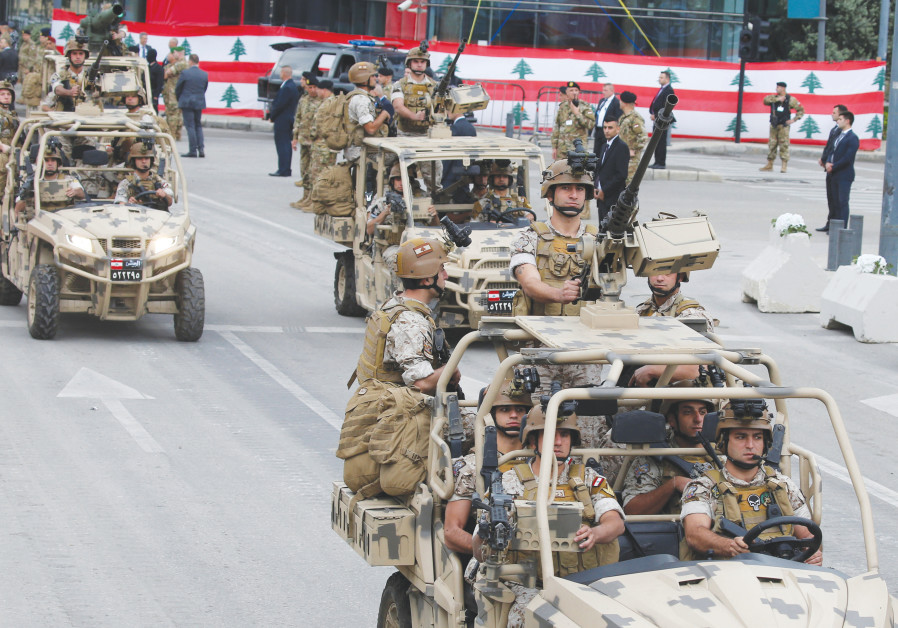Is the U.S. funding of Lebanese Army strengthening Hezbollah?

LEBANESE SOLDIERS taking part in a parade. . (photo credit: REUTERS)
The Trump administration is boosting its “maximum pressure” policy against Iran, but the US remains the main benefactor of the Lebanese Armed Forces, despite it having been penetrated and influenced by Hezbollah, the powerful and loyal proxy of Tehran in Lebanon. This paradoxical situation is based on a misconception, and as such it must be stopped.
During the first few months of 2019, the US imposed new sanctions targeting fund-raising sources of Hezbollah, listed by Washington as a terror group in 1997 and responsible for the killing of hundreds of Americans, as well as posing a severe military threat to Israel.
At the very same time, under the radar, shipments of American advanced military equipment have landed in Beirut, suggesting that the current administration is continuing the strategy of its two predecessors to strengthen the military forces of the Middle Eastern country: Since 2005, the US has provided the Lebanese army with aid valued at $2.3 billion – including tanks, light aircraft, and drones – thus becoming the source of about 80% of its equipment, in addition to training more than 30,000 Lebanese soldiers. While no one is deluded that the Lebanese army could confront and disarm Hezbollah, the military support is presumably supposed to turn the army into a strong governmental force that would pose a moderate counterweight to Hezbollah within the Lebanese arena. This is a very simple and logical rationale, but its only flaw is that it belongs in the past.
The hard truth is that Hezbollah and the Lebanese state are, in fact, no longer two different entities. The radical Shi’ite organization, which has both military and civilian branches, has turned to politics over the years, and has gradually become an intrinsic part of the Lebanese political system.
During the 2006 war between Israel and Hezbollah, the Lebanese government had disavowed the organization. Today, however, Hezbollah is not just a part of the government, but even its local opponents – headed by Prime Minister Saad Hariri – have accepted its legitimacy as both an armed group and political component.
In the elections held last year, the political bloc that is dominated by Hezbollah gained decisive power in the parliament and the cabinet, including in nominating the president (a position filled today by Hezbollah’s ally, Michel Aoun). Considering the vast identification and affection Hezbollah currently maintains in Lebanon, particularly among the Shi’ite sect – which encompasses between 30% to 40% of the population, many of whom are employed by, study at or receive social services from Hezbollah’s civil affiliations – the expectation that the local armed forces would remain impartial was somewhat naive.
This illustrates how the lessons from five years ago, when the US-equipped Iraqi army collapsed in the face of ISIS, have yet to be learned, proving that the backing of states’ governmental forces must be carried out in tandem with taking account of the particular social context.
Indeed, Hezbollah has been significantly increasing its sway over the Lebanese army: Last year, Israeli intelligence reports pointed out operational and intelligence collaboration between the army and Hezbollah, such as joint patrols in which Hezbollah members wore army uniforms.
Further, the organization has been able to infiltrate its agents into the ranks of the army as soldiers and officers. For instance, a unit commander in the Israeli border area with a high rank was exposed as a Hezbollah insider. In military parades in 2016, Hezbollah itself showed off US-made armored personnel carriers, presumably taken from the Lebanese military. In general, the army is proving time after time its incompetence – or unwillingness – to prevent Hezbollah’s increasing buildup, which largely consists of Iranian weapons systems smuggled into the country, either under the nose of the army or in its tacit consent.
Although the decision-makers in Washington seem to be aware of these realities, in advocating the armament of the Lebanese military, American officials have stressed that this aid is crucial to prevent external menaces to Lebanon – such as another destructive war between Hezbollah and Israel, or spillover of the war in Syria into Lebanon.
Yet, these arguments still do not hold true. Regarding the tensions with Israel, the Lebanese military is clearly not fulfilling the mission assigned to it in the UN resolution following the 2006 war: to enforce the prohibition on Hezbollah from being in the southern region adjacent to Israel. In December, it was revealed that Hezbollah had dug military tunnels right under the Israeli border.
Sources within the UN peacekeeping force even accused the Lebanese army last year of helping Hezbollah to violate the resolution, by preventing the UN inspectors from reaching the border villages in which the organization hides its weapons. As for the threats looming from Syria, the US-backed Lebanese army was not successful in undertaking the low-scale military challenge of defending northeastern Lebanon, which was faced in the recent years with jihadi infiltration from Syria. Instead, Hezbollah – yes, Hezbollah – was called in to accomplish this national duty.
The temptation to bolster the Lebanese forces to enhance Lebanon’s sovereignty is understandable, but given the discernible clout of Hezbollah over the Lebanese army, the insistence to continue to distinguish between the two is not merely a fruitless investment, but pure malpractice that endangers the security of both Lebanon and Israel.
Halting the military aid to Lebanon could be a last-ditch wake-up call to the local opposition against Hezbollah – and everyone concerned with the country’s sovereignty – clarifying that they must strive to push Hezbollah out of power. Under the current circumstances, the American armament of the Lebanese army is an own goal for the US.
The writer is a Middle East and security analyst.
Now is the time to join the news event of the year – The Jerusalem Post Annual Conference!
For more information and to sign up, click here>>






Comments are closed.